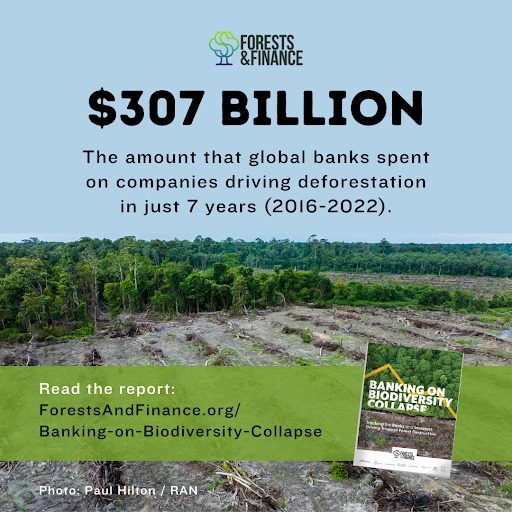4 Desember 2023 5 menit
Kebijakan bank dan investor besar ditemukan mempercepat kerusakan hutan, hilangnya keanekaragaman hayati, perubahan iklim dan pelanggaran hak asasi manusia

DI EMBARGO SAMPAI
Minggu, 3 Desember, 21.00 PST // Senin, 4 Desember, 00.00 EST / 06:00 CET / 11:00 Jakarta / 13:00 Tokyo
Narahubung: Laurel Sutherlin, [email protected] , +1 415.246.0161
Kebijakan bank dan investor besar ditemukan mempercepat kerusakan hutan, hilangnya keanekaragaman hayati, perubahan iklim dan pelanggaran hak asasi manusia
Analisis terbaru mendokumentasikan $307 miliar yang mengalir dari pendanaan besar ke komoditas yang berisiko terhadap hutan mendorong deforestasi hutan tropis besar-besaran.
Sebuah laporan terbaru yang dirilis hari ini, pada ‘Finance Day’ di COP28 oleh Forests & Finance Coalition, memberikan pandangan komprehensif mengenai peran pendanaan besar dalam mendorong deforestasi, hilangnya keanekaragaman hayati, perubahan iklim dan pelanggaran hak asasi manusia di kawasan hutan tropis. Laporan tersebut mengungkapkan bahwa sejak Perjanjian Paris, bank-bank telah menyalurkan lebih dari $307 miliar ke perusahaan-perusahaan kehutanan dan pertanian yang berisiko tinggi terkait dengan deforestasi hutan tropis. Hal ini membuktikan bahwa kebijakan-kebijakan bank-bank besar dan investor global gagal mencegah hilangnya hutan beserta keanekaragaman hayati di dalamnya.
“Banking on Biodiversity Collapse: Melacak bank dan investor yang mendorong deforestasi hutan tropis,” memetakan aliran keuangan komersial ke sektor kehutanan yang beroperasi di 300 perusahaan dalam enam sektor komoditas yang berisiko terhadap hutan – daging sapi, minyak sawit, pulp dan kertas, karet, kedelai, dan kayu – yang secara kolektif menyebabkan sebagian besar deforestasi di hutan tropis secara global. Laporan tersebut mengidentifikasi bank dan investor mana yang memainkan peran terbesar dalam penyediaan kredit, penjaminan emisi, kepemilikan obligasi, dan kepemilikan saham. Di antara 30 bankir terbesar yang berisiko terhadap hutan adalah bank-bank besar dari negara-negara hutan tropis termasuk Brazil dan Indonesia, serta bank-bank yang berasal dari yurisdiksi impor dan keuangan yang signifikan seperti AS, UE, Jepang, dan Tiongkok.
Laporan ini selanjutnya menilai kualitas kebijakan bank yang mengatur investasi di sektor-sektor yang berdampak besar. Kebijakan bank dan investor dinilai berdasarkan 38 kriteria. Mengecewakan, rata-rata skor kebijakan hanya sebesar 17%. Hasil penilaian pun menunjukkan hanya 20 bank dan investor yang mendapatkan skor 30% atau lebih. Hanya dua bank yang mendapat skor di atas 50% untuk skor kebijakan – yang menunjukkan kesenjangan besar antara jumlah uang yang disalurkan ke sektor-sektor ini dan upaya perlindungan yang diterapkan untuk mencegah deforestasi massal dan pelanggaran hak asasi manusia.
Laporan tersebut menemukan bahwa bank pemberi dana terbesar, Banco do Brasil dan Bradesco, yang sebagian besar membiayai sektor daging sapi dan kedelai di Brazil, memiliki kebijakan yang minim untuk mencegah deforestasi dan pelanggaran hak asasi manusia. Raksasa JPMorgan Chase, Bank of America dan Citigroup memainkan peran utama dalam industri pulp dan kertas serta minyak sawit, namun terbukti gagal melindungi hutan, keanekaragaman hayati, dan hak asasi manusia dalam kebijakan mereka. JPMorgan Chase, Bank of America dan Citigroup menerima skor yang sangat buruk: JPMorgan Chase hanya sebesar 15%, Bank of America sebesar 22%, dan Citigroup sebesar 37%.
Temuan-temuan dalam laporan ini menyoroti kebutuhan mendesak akan peraturan yang kuat yang mencakup lembaga-lembaga keuangan untuk diterapkan di yurisdiksi-yurisdiksi utama. Laporan tersebut menekankan bahwa pemerintah dan lembaga keuangan mempunyai tanggung jawab berdasarkan Pasal 2.1c Perjanjian Paris dan Target 14 dan 15 Kerangka Keanekaragaman Hayati Global untuk menyelaraskan aliran keuangan mereka guna mencapai tujuan iklim publik dan keanekaragaman hayati. Meskipun data menunjukkan adanya fluktuasi dalam total kredit dan investasi tahunan dari tahun 2016 hingga 2023, tidak ada tren penurunan modal yang memfasilitasi perluasan produksi komoditas yang berisiko terhadap hutan.
“Banyak orang mungkin terkejut mengetahui bahwa banyak, bahkan sebagian besar, yurisdiksi, lembaga keuangan legal untuk membiayai perusahaan yang terlibat dalam kejahatan lingkungan,” kata Merel van der Mark, Koordinator Forests & Finance. “Data ini menunjukkan betapa munafiknya lembaga-lembaga keuangan yang tergabung dalam inisiatif keberlanjutan seperti Principles for Responsible Investment or Principles for Responsible Banking, atau yang memiliki komitmen Net Zero tetapi terus membiayai perusahaan yang membuat tujuan tersebut mustahil tercapai. Membiarkan lembaga-lembaga keuangan untuk menetapkan standar-standar ESG mereka sendiri tidak akan cukup untuk mengalihkan aliran keuangan menuju praktik-praktik berkelanjutan. Pada akhirnya, pemerintah harus menetapkan kebijakan dan sanksi yang diperlukan untuk menjaga masyarakat dan ekosistem tempat kita bergantung”.
Selain mencatat aliran dana dan menganalisis kebijakan sektoral, laporan ini juga menyajikan beberapa kasus yang menggambarkan dampak pendanaan ini terhadap hutan dan masyarakat di Indonesia dan Amazon di Brazil. Penelitian ini mengungkap empat perusak hutan yang terus meraup milyaran dolar pendanaan meskipun mereka telah dikaitkan dengan dampak sosial dan lingkungan yang berbahaya dan terdokumentasi dengan baik, sering kali dalam jangka waktu bertahun-tahun dan menunjukkan pola perilaku penipu dalam jangka panjang: JBS, Cargill, Royal Golden Eagle, dan Grup Sinar Mas.
Laporan tersebut menyimpulkan bahwa regulator keuangan dan lembaga keuangan harus mengambil langkah-langkah mendesak untuk menyelaraskan aliran keuangan mereka guna mendorong transisi yang adil yang diperlukan untuk menjaga masyarakat dan ekosistem tempat kita bergantung, sejalan dengan tujuan kebijakan publik internasional. Untuk mencapai hal tersebut, Koalisi Forests & Finance menyerukan sektor keuangan untuk mengadopsi 5 prinsip dasar, yang mencakup menghentikan dan memulihkan hilangnya keanekaragaman hayati, menghormati dan memprioritaskan hak-hak masyarakat adat dan komunitas lokal, mendorong transisi yang adil, memastikan integritas ekosistem, dan menyelaraskan tujuan serta instrumen kelembagaan lintas sektor dan isu.
Forests & Finance adalah koalisi organisasi kampanye, akar rumput, dan penelitian termasuk Rainforest Action Network, TuK INDONESIA, Profundo, Amazon Watch, Repórter Brasil, BankTrack, Sahabat Alam Malaysia, dan Friends of the Earth US.
This post is also available in: English
